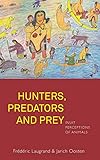Hunters, Predators and Prey : Inuit Perceptions of Animals / Jarich Oosten, Frédéric Laugrand.
Material type: TextPublisher: New York ; Oxford : Berghahn Books, [2014]Copyright date: ©2014Description: 1 online resource (418 p.)Content type:
TextPublisher: New York ; Oxford : Berghahn Books, [2014]Copyright date: ©2014Description: 1 online resource (418 p.)Content type: - 9781782384052
- 9781782384069
- 398.24/5 23
- E99.E7 L368 2014
- online - DeGruyter
| Item type | Current library | Call number | URL | Status | Notes | Barcode | |
|---|---|---|---|---|---|---|---|
 eBook
eBook
|
Biblioteca "Angelicum" Pont. Univ. S.Tommaso d'Aquino Nuvola online | online - DeGruyter (Browse shelf(Opens below)) | Online access | Not for loan (Accesso limitato) | Accesso per gli utenti autorizzati / Access for authorized users | (dgr)9781782384069 |
Frontmatter -- Contents -- Figures -- Acknowledgements -- Part I. Introduction -- CHAPTER 1 Theoretical Perspectives -- CHAPTER 2 The Animals and Their Environment -- CHAPTER 3 The Making of a Good Hunter -- Part II. Life and Death -- CHAPTER 4 The Raven, the Bringer of Light -- CHAPTER 5 Qupirruit, Masters of Life and Death -- Part III. Fellow Hunters -- CHAPTER 6 The Dog, Partner of the Hunter -- CHAPTER 7 The Bear, a Fellow Hunter -- Part IV. Prey -- CHAPTER 8 The Caribou, the Lice of the Earth -- CHAPTER 9 The Seal, the Offspring of the Sea Woman -- CHAPTER 10 The Whale, Representing the Whole -- Comparisons and Conclusions -- APPENDIX Inuit Elders -- Glossary of Inuktitut Words -- References -- Index
restricted access online access with authorization star
http://purl.org/coar/access_right/c_16ec
Inuit hunting traditions are rich in perceptions, practices and stories relating to animals and human beings. The authors examine key figures such as the raven, an animal that has a central place in Inuit culture as a creator and a trickster, and qupirruit, a category consisting of insects and other small life forms. After these non-social and inedible animals, they discuss the dog, the companion of the hunter, and the fellow hunter, the bear, considered to resemble a human being. A discussion of the renewal of whale hunting accompanies the chapters about animals considered ‘prey par excellence’: the caribou, the seals and the whale, symbol of the whole. By giving precedence to Inuit categories such as ‘inua’ (owner) and ‘tarniq’ (shade) over European concepts such as ‘spirit ‘and ‘soul’, the book compares and contrasts human beings and animals to provide a better understanding of human-animal relationships in a hunting society.
Mode of access: Internet via World Wide Web.
In English.
Description based on online resource; title from PDF title page (publisher's Web site, viewed 25. Jun 2024)


